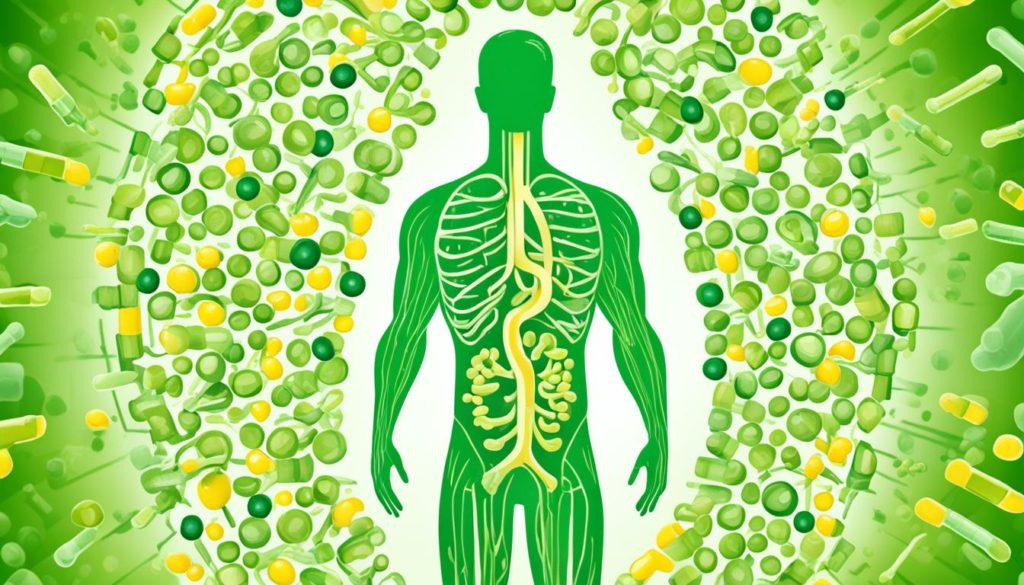Lactobacillus acidophilus is a powerful probiotic that’s important for our gut health. Studies show this bacterium is key to our overall health. It helps with digestion and strengthens our immune system. Let’s explore how Lactobacillus acidophilus can improve our health and why it’s so good for us.
Key Takeaways
- Lactobacillus acidophilus significantly improves gut health.
- It plays a vital role in enhancing immune function.
- This probiotic aids in efficient digestion and nutrient absorption.
- Lactobacillus acidophilus can help balance intestinal flora.
- Incorporating this probiotic into your diet ensures optimal probiotic effectiveness.
Introduction to Lactobacillus Acidophilus
L. acidophilus is important for our health. It’s a beneficial bacteria with many health benefits. It plays a key role in our body’s microbiome.

What is Lactobacillus Acidophilus?
This bacteria is found in our gut. It helps with digestion, absorbing nutrients, and boosting our immune system. By producing lactic acid, it fights off harmful bacteria. This keeps our gut healthy and balanced.
History and Discovery
The story of L. acidophilus began in the early 20th century. It was first discovered by scientists then. Elie Metchnikoff, who won the Nobel Prize, thought beneficial bacteria could make us live longer. His research led to the discovery of L. acidophilus. This was a big step in linking gut bacteria to good health.
Role in the Microbiome
In our microbiome, L. acidophilus is very important. It fights off bad bacteria and keeps our gut healthy. It helps our digestive system work well, makes nutrient absorption better, and strengthens our immune system. Check out this health guide for more info on gut health.
Also, L. acidophilus boosts our body’s defenses. It helps produce antibodies and improves immune function. Knowing about this bacteria can change how we see health and nutrition.
Health Benefits of Lactobacillus Acidophilus
Lactobacillus acidophilus is a famous probiotic with many health benefits. It mainly improves gut health, boosts the immune system, and aids digestion. Adding this probiotic to your daily life can greatly improve your health.

Improving Gut Health
Lactobacillus acidophilus helps keep a healthy balance in your gut. It ensures there are enough good bacteria for your digestive system. This balance is key for absorbing nutrients and keeping your intestines healthy.
Boosting Immune Function
Adding Lactobacillus acidophilus to your diet strengthens your immune system. It activates your body’s defenses, helping you fight off infections. This boost is a top benefit of this probiotic. Learn more about these advantages here.
Supporting Digestive Health
Lactobacillus acidophilus also promotes digestive health. If you eat it regularly, it can ease problems like bloating and constipation. This makes your digestion smoother and more comfortable. It keeps your digestive health in good shape for the long run.
Role in Digestion
Lactobacillus acidophilus is key for good digestion and gut health. It helps our body absorb important nutrients well.
Enhancing Nutrient Absorption
Lactobacillus acidophilus boosts our nutrient absorption. It breaks down food so our bodies can easily take in vitamins and minerals. This is vital for our health and helps our body function properly.
Reducing Digestive Disorders
Lactobacillus acidophilus also helps with digestive problems. It keeps our gut bacteria balanced, which is crucial for gut health. This keeps away issues like bloating, constipation, and diarrhea, making our digestion smoother.
Probiotics and Gut Health
Keeping your gut healthy is vital for your overall health. Probiotics, especially Lactobacillus Acidophilus, are key. They help balance the bacteria in your gut, important for digestion and your immune system.
Research shows that probiotics can greatly better gut health. They lessen issues like constipation and diarrhea linked to antibiotics. A good balance between Lactobacillus Acidophilus and gut bacteria is key. It helps with nutrient absorption and digestive system function.
Probiotics do more than help with digestion. Studies show they’re also good for people of all ages, from babies to seniors. They’ve helped prevent serious diseases in newborns and eased stomach problems in older people.
Adding probiotics to your diet supports a healthy gut. This choice can boost your overall health. With ongoing research, the advantages of probiotics are becoming clearer. They play an essential role in a balanced, healthy gut.
How Lactobacillus Acidophilus Supports the Microbiome
Lactobacillus acidophilus plays a key role in keeping our microbiome healthy. It helps make sure there’s a good balance of microflora needed for top health. It creates an environment that favors good bacteria, helping to maintain balance and control bad ones.
Balancing Intestinal Flora
Lactobacillus acidophilus is crucial for the balance of bacteria in our intestines. It fights off bad bacteria by taking away their food and space on intestinal walls. This balance is vital for digesting food well, absorbing nutrients, and keeping our gut health in check.
Combating Harmful Bacteria
Lactobacillus acidophilus is a warrior against harmful bacteria. It produces lactic acid, hydrogen peroxide, and bacteriocins, which stop bad microbes from growing. This lowers the number of bad bacteria, making space for good bacteria to grow. It boosts our immune system and helps prevent infections.
Here’s how Lactobacillus acidophilus works for our benefit:
| Function | Impact |
|---|---|
| Balancing Intestinal Flora | Maintains a healthy microflora balance |
| Combating Harmful Bacteria | Produces antimicrobial substances that exhibit antagonistic effects on pathogens |
| Microbiota Enhancement | Supports growth of beneficial bacteria |
The Importance of Beneficial Bacteria
In our journey towards better health, we must understand essential microorganisms’ role. Beneficial bacteria, like Lactobacillus acidophilus, are key players. They help balance our guts and fight off harmful germs.
These microorganisms are heroes in our digestive system. They help us absorb nutrients and boost our immune response. For example, Lactobacillus acidophilus aids in vitamin production and food digestion. This keeps our gut healthy and strengthens our body’s defense mechanisms.
Furthermore, these good bacteria can ease symptoms of gut issues. By increasing beneficial microorganisms in our gut, people see better digestive health. They also feel less discomfort from conditions like irritable bowel syndrome and inflammatory bowel disease.
Adding these crucial microorganisms to our daily routine can greatly benefit us. Let’s see a comparison of benefits from different beneficial bacteria:
| Bacteria Type | Key Benefits |
|---|---|
| Lactobacillus acidophilus | Enhances nutrient absorption, boosts immune system, fights harmful bacteria |
| Bifidobacterium bifidum | Reduces gut inflammation, improves lactose digestion, supports healthy gut flora |
| Streptococcus thermophilus | Aids in lactose digestion, contributes to healthy microbiome balance |
Understanding the importance of beneficial bacteria is a big step towards total wellness. By including them in our diet or taking supplements, we work towards a healthier, stronger body.
Choosing Probiotic Supplements
When picking probiotics, knowing about different types and important tips can help you choose wisely.
Types of Probiotic Supplements
Probiotic supplements come in many forms. Each has its own set of benefits depending on what you need. Let’s look at the most common types:
- Capsules and Tablets: These are easy to use, giving you probiotics in a clear dose.
- Powders: Powders can be mixed with your food or drink. This makes adjusting the dose simple.
- Liquid Drops: These are great for kids or anyone who doesn’t like pills. Liquid drops are easy to take.
- Gummies: Gummies are a fun, tasty way to get your probiotics. Both kids and adults like them.
Factors to Consider
Choosing the right probiotic needs thought on a few things for the best outcome. Here are key tips:
- Strain Specificity: Different strains help with different health issues. Pick one that fits your needs.
- CFU Count: The CFU tells you how many bacteria are in it. More CFUs can be better for bigger health goals.
- Quality and Storage: Some need to be kept cold. Choose trusted brands for the best quality.
- Allergens and Additives: Make sure it’s free from things you’re allergic to and unwanted extras. Always read the label.
- Consult Healthcare Professionals: Talk to a doctor before starting any new supplement, to be safe.
For extra tips on choosing probiotics, check out this detailed guide.
Lactobacillus Acidophilus in Your Diet
Lactobacillus acidophilus is a key probiotic noted for its health benefits. Adding it through foods and wise diet tips can boost gut health and wellness.
Natural Food Sources
Eating fermented foods daily is a great way to get Lactobacillus acidophilus. These foods, rich in probiotics, help maintain a healthy gut.
- Yogurt: A well-known source of Lactobacillus acidophilus. Look for yogurts that mention live cultures.
- Kefir: A fermented milk drink rich in probiotics.
- Fermented Vegetables: Sauerkraut and kimchi are full of Lactobacillus acidophilus.
- Miso: Made from fermented soybeans, it’s a beneficial choice.
Dietary Recommendations
For the best probiotic benefits, eat a mix of fermented foods often. It keeps your gut bacteria balanced and ensures a steady flow of good bacteria.
- Daily Consumption: Add a probiotic-rich food to every meal.
- Variety: Switch up your probiotic sources to get different bacteria.
- Quality: Choose high-quality, organic foods when you can for the best effects from your dietary intake of probiotics.
Here’s a table showing fermented foods, their probiotic benefits, and how to best enjoy them:
| Food | Probiotic Content | Consumption Tips |
|---|---|---|
| Yogurt | High in Lactobacillus acidophilus | Eat with breakfast or as a snack. Look for “live and active cultures”. |
| Kefir | Has many probiotic strains | Drink it daily or blend into smoothies. Choose unsweetened kinds. |
| Sauerkraut | Full of various probiotics | Use it in salads or as a topping. Make sure it’s raw and not pasteurized. |
| Kimchi | Has many good bacteria | Add to rice meals or as a side dish. Opt for naturally fermented kinds. |
| Miso | Offers Lactobacillus and more probiotics | Use for making soup or as flavoring in dishes. |
Common Myths About Probiotics
When we talk about probiotics, like Lactobacillus acidophilus, it’s key to clear up false beliefs. Many think all probiotics work the same. But each type offers different benefits for our health. That’s why it’s crucial to learn the truth from reliable sources when choosing what to take.
Some people believe that if you eat well, you don’t need probiotics. However, probiotics have special roles in keeping your gut healthy. This is something food alone can’t always do. It’s also mistaken that fermented foods always have probiotics. Only some have the beneficial cultures found in specific supplements.
- Myth: Probiotics can replace medication.
Reality: Probiotics are supplements. They’re not meant to take the place of medicine. They support health but aren’t a cure-all. - Myth: Probiotics must be taken on an empty stomach.
Reality: When you take probiotics doesn’t impact their effectiveness much. What matters more is taking them regularly. - Myth: All probiotics are the same.
Reality: Strains like L. acidophilus and B. bifidum have different benefits. It’s important to research and choose what meets your health needs.
Tackling these myths is important to truly understand probiotics. Using reliable information, we make better choices for our health. Whether it’s improving gut health, boosting immunity, or feeling healthier, knowing the facts about probiotics helps us. It allows us to dispel myths and reach our health goals.
Potential Side Effects
Lactobacillus acidophilus is often praised for its health perks. Yet, it’s wise to know about possible side effects. Learning about the risks is key to making the right choices for your health.
Understanding Risks
When you first take probiotics, you might have minor stomach issues. This includes bloating, gas, or an upset stomach. These issues usually pass as your body gets used to the good bacteria.
But sometimes, serious problems can happen. These are rare and include infections. They are more likely in people with weak immune systems or health problems.
Listen to how your body reacts to probiotics. Talk to a doctor if bad symptoms stick around or get worse.
Who Should Avoid Probiotics?
Some people need to be extra careful with probiotics. Probiotic side effects can hit harder or be more dangerous for them:
- Those with weak immune systems, like cancer patients or those with HIV/AIDS.
- People with serious illnesses or who just had big surgeries.
- Pregnant or breastfeeding women should check with their doctors first.
It’s critical to always get advice from a healthcare expert before starting probiotics. They’ll know what’s best for your health situation.
Conclusion
Lactobacillus acidophilus is key for a healthy gut, improved immune system, and better digestion. It balances your gut by fighting bad bacteria. This makes it essential for your health routine.
Before adding this probiotic to your diet, think about your health needs. You can get it from foods or supplements. But, making the right choice is important. Know the side effects and what type suits your life and health.
Understanding the benefits of Lactobacillus acidophilus is vital for good health. It helps you keep a balanced and healthy gut. This supports your overall well-being.
FAQ
What is Lactobacillus acidophilus?
A: Lactobacillus acidophilus is good bacteria found in your gut and body. It’s a probiotic that helps keep your gut healthy and supports overall well-being.
What are the benefits of taking Lactobacillus acidophilus?
This probiotic boosts gut health, immune function, and digestion. It helps absorb nutrients and fights digestive issues. It keeps harmful bacteria in check, ensuring a balanced gut.
How does Lactobacillus acidophilus support gut health?
It balances gut bacteria, improves digestion, and stops bad bacteria from growing. This enhances gut health and promotes a healthy microbiome.
Are there any side effects of taking Lactobacillus acidophilus?
Most people can safely use it, but some might get gas, bloating, or discomfort. Always talk to a doctor first if you have health issues or a weak immune system.
Can Lactobacillus acidophilus improve immune function?
Yes, it boosts your immune system. It makes antibodies and strengthens immune cells. This helps fight off infections.
What foods are rich in Lactobacillus acidophilus?
Foods like yogurt, kefir, sauerkraut, miso, and some cheeses are full of this probiotic. They’re great for adding it to your diet.
How do I choose the right probiotic supplement containing Lactobacillus acidophilus?
Look for a supplement with the right strains, a high CFU count, and solid science backing. Make sure it suits your health needs.
What role does Lactobacillus acidophilus play in the microbiome?
It’s important for a healthy gut, stopping bad pathogens, and helping with nutrient metabolism. This probiotic is key to gut balance.
Are there any specific groups who should avoid taking Lactobacillus acidophilus?
People with weak immune systems or serious health issues should talk to their doctor before taking this probiotic.
What are some common myths about probiotics and Lactobacillus acidophilus?
Myths include all probiotics being the same and working right away. In truth, different strains offer different benefits, and effects vary. The right dose depends on personal health goals.


